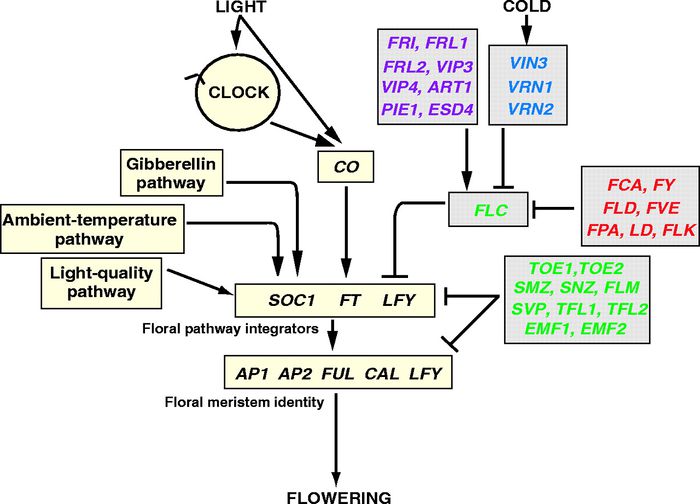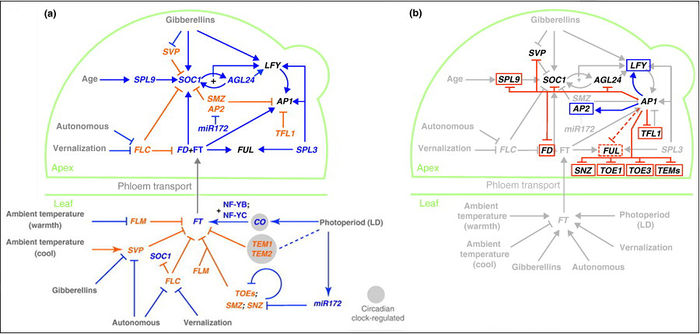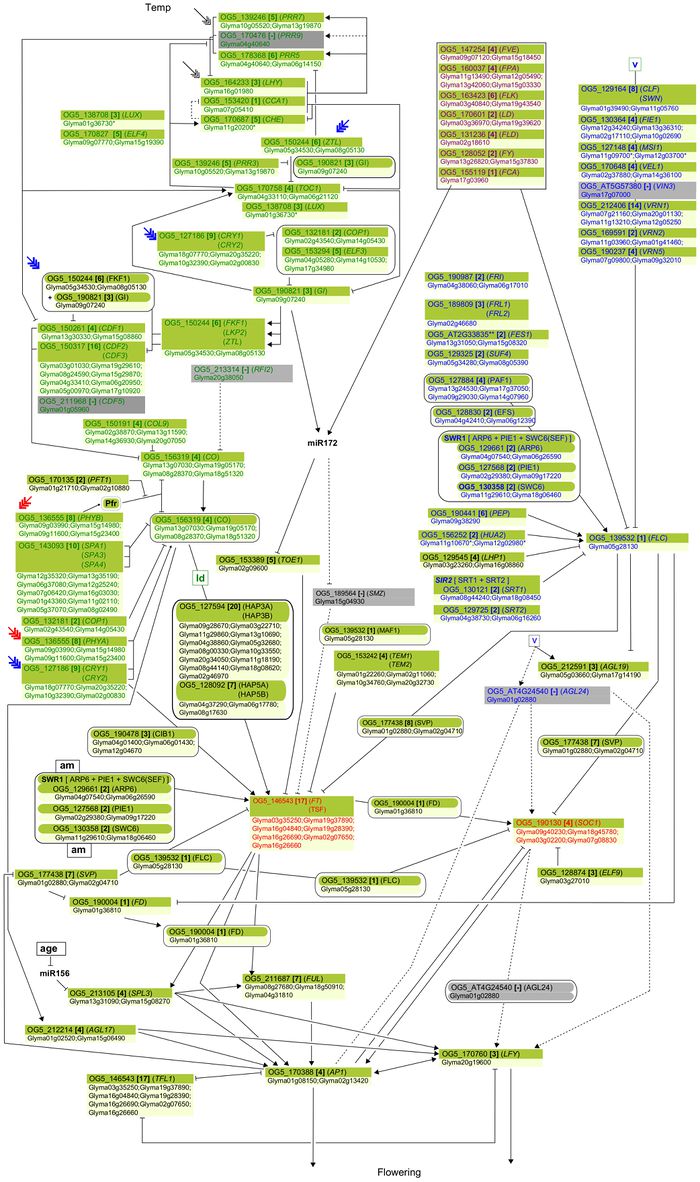Difference between revisions of "Time of bloom"
| Line 1: | Line 1: | ||
__TOC__ | __TOC__ | ||
| + | |||
| + | ===To Do=== | ||
| + | |||
| + | Note all <i>Arabidopsis</i> genes in [[File:183_Arabidopsis_Flowering_Genes.pdf]] from [http://www.plosone.org/article/info%3Adoi%2F10.1371%2Fjournal.pone.0038250 Jung et al., 2012]. | ||
| + | <br/>Look for strawberry orthologs of <i>Arabidopsis</i> genes, such as in [http://www.biomedcentral.com/1471-2229/9/122 Mouhu et al., 2009]. | ||
| + | |||
===<i>Arabidopsis</i> Flowering Pathway (2004-Present)=== | ===<i>Arabidopsis</i> Flowering Pathway (2004-Present)=== | ||
| Line 18: | Line 24: | ||
[http://dev.biologists.org/content/131/16/3829/F1.expansion.html Henderson and Dean, 2004]; [http://pcp.oxfordjournals.org/content/46/8/1175/F7.expansion Yamaguchi et al., 2005]; [http://dev.biologists.org/content/136/20/3379/F3.expansion.html Liu et al., 2009]; [http://5e.plantphys.net/article.php?ch=1&id=375 Taiz and Zeiger, 2010]; [http://www.plantcell.org/content/16/suppl_1/S18/F2.expansion Boss et al., 2004]; [http://openi.nlm.nih.gov/detailedresult.php?img=3039610_1471-2164-12-63-6&query=the&fields=all&favor=none&it=none&sub=none&uniq=0&sp=none&req=4&simResults=f0a0c433%20f0a1c418%20f0a2c0%20f1a0c161%20f2a0c444%20f2a1c438%20f3a0c224%20f4a0c18%20f4a1c1%20f4a2c23&npos=37&prt=2 Zhang et al., 2011]; [http://openi.nlm.nih.gov/detailedresult.php?img=3049749_2041-9139-2-4-1&query=the&fields=all&favor=none&it=none&sub=none&uniq=0&sp=none&req=4&simCollection=1187896_1471-2202-6-48-3&npos=55&prt=3 Ballerini and Kramer, 2011]; [http://www.sciencedirect.com/science/article/pii/S1369526611001440 Posé et al., 2012]; [http://www.pnas.org/content/107/39/17029/F6.expansion.html Kim and Sung, 2010]; [http://www.sciencedirect.com/science/article/pii/S0168952510001873 Wellmer and Riechmann, 2010]; [http://www.sciencedirect.com/science/article/pii/S1084952108000566 Farrona et al., 2008]; [http://www.sciencedirect.com/science/article/pii/S1360138504002705 He and Amasino, 2005]; [http://www.mpipz.mpg.de/305695/Project_1 Max Planck Institute for Plant Breeding Research]; [http://www.sciencedirect.com/science/article/pii/S009286740600571X Bäurle and Dean, 2006]; [http://www.sciencedirect.com/science/article/pii/S1369526602000146 Sung et al., 2003]; [http://www.els.net/WileyCDA/ElsArticle/refId-a0002053.html Schneitz, 2009]; [http://www.sciencedirect.com/science/article/pii/S0958166905000273 Amasino, 2005]; [http://www.sciencedirect.com/science/article/pii/S0958166910002284 Ferrier et al., 2011]; [http://www.sciencedirect.com/science/article/pii/S1369526603000141 Izawa et al., 2003]; [http://www.plosone.org/article/info%3Adoi%2F10.1371%2Fjournal.pone.0038250 Jung et al., 2012] | [http://dev.biologists.org/content/131/16/3829/F1.expansion.html Henderson and Dean, 2004]; [http://pcp.oxfordjournals.org/content/46/8/1175/F7.expansion Yamaguchi et al., 2005]; [http://dev.biologists.org/content/136/20/3379/F3.expansion.html Liu et al., 2009]; [http://5e.plantphys.net/article.php?ch=1&id=375 Taiz and Zeiger, 2010]; [http://www.plantcell.org/content/16/suppl_1/S18/F2.expansion Boss et al., 2004]; [http://openi.nlm.nih.gov/detailedresult.php?img=3039610_1471-2164-12-63-6&query=the&fields=all&favor=none&it=none&sub=none&uniq=0&sp=none&req=4&simResults=f0a0c433%20f0a1c418%20f0a2c0%20f1a0c161%20f2a0c444%20f2a1c438%20f3a0c224%20f4a0c18%20f4a1c1%20f4a2c23&npos=37&prt=2 Zhang et al., 2011]; [http://openi.nlm.nih.gov/detailedresult.php?img=3049749_2041-9139-2-4-1&query=the&fields=all&favor=none&it=none&sub=none&uniq=0&sp=none&req=4&simCollection=1187896_1471-2202-6-48-3&npos=55&prt=3 Ballerini and Kramer, 2011]; [http://www.sciencedirect.com/science/article/pii/S1369526611001440 Posé et al., 2012]; [http://www.pnas.org/content/107/39/17029/F6.expansion.html Kim and Sung, 2010]; [http://www.sciencedirect.com/science/article/pii/S0168952510001873 Wellmer and Riechmann, 2010]; [http://www.sciencedirect.com/science/article/pii/S1084952108000566 Farrona et al., 2008]; [http://www.sciencedirect.com/science/article/pii/S1360138504002705 He and Amasino, 2005]; [http://www.mpipz.mpg.de/305695/Project_1 Max Planck Institute for Plant Breeding Research]; [http://www.sciencedirect.com/science/article/pii/S009286740600571X Bäurle and Dean, 2006]; [http://www.sciencedirect.com/science/article/pii/S1369526602000146 Sung et al., 2003]; [http://www.els.net/WileyCDA/ElsArticle/refId-a0002053.html Schneitz, 2009]; [http://www.sciencedirect.com/science/article/pii/S0958166905000273 Amasino, 2005]; [http://www.sciencedirect.com/science/article/pii/S0958166910002284 Ferrier et al., 2011]; [http://www.sciencedirect.com/science/article/pii/S1369526603000141 Izawa et al., 2003]; [http://www.plosone.org/article/info%3Adoi%2F10.1371%2Fjournal.pone.0038250 Jung et al., 2012] | ||
| − | |||
| − | |||
| − | |||
| − | |||
| − | |||
| − | |||
Revision as of 07:00, 14 February 2013
Contents
To Do
Note all Arabidopsis genes in File:Jung 207 Arabidopsis Flowering Genes.pdf from Jung et al., 2012.
Look for strawberry orthologs of Arabidopsis genes, such as in Mouhu et al., 2009.
Arabidopsis Flowering Pathway (2004-Present)

Overall pathway for the time of bloom from Henderson and Dean, 2004.
Overall pathway for the time of bloom from Schneitz, 2009.

"The Arabidopsis floral transition network has been delineated as a result of extensive genetic analyses (depicted in a), but genome-wide studies have uncovered new molecular interactions and highlighted the role of AP1 as both a molecular switch and a network hub (shown in b)."
Overall pathway for the time of bloom from Wellmer and Riechmann, 2010 and Ferrier et al., 2011.

"Soybean genes marked with * are those that share the same clade with Arabidopsis genes but have not been investigated so far as flowering genes ... Arrows show promoting effects, T-bars show repressing effects. Environmental cues are shown as lower case letters in square boxes; ‘v’ is extended cold (vernalization); ‘ld’ is long days; ‘sd’ is short days; ‘am’ is ambient (non-vernalizing) temperature. Genes are shown in italics and proteins in non-italics in ovals. ‘Pfr’ indicates Pfr phytochrome signaling. Arabidopsis genes assigned to specific pathways are color-coded (photoperiod pathway in green, vernalization in blue and autonomous pathway in purple). Flowering pathway integrators are shown in red. Triple headed arrows indicate activation by red or blue light."
Overall pathway for the time of bloom from Jung et al., 2012.
All Arabidopsis Flowering Pathways
Henderson and Dean, 2004; Yamaguchi et al., 2005; Liu et al., 2009; Taiz and Zeiger, 2010; Boss et al., 2004; Zhang et al., 2011; Ballerini and Kramer, 2011; Posé et al., 2012; Kim and Sung, 2010; Wellmer and Riechmann, 2010; Farrona et al., 2008; He and Amasino, 2005; Max Planck Institute for Plant Breeding Research; Bäurle and Dean, 2006; Sung et al., 2003; Schneitz, 2009; Amasino, 2005; Ferrier et al., 2011; Izawa et al., 2003; Jung et al., 2012
Arabidopsis Flowering Genes
| Abbreviation | Name | Sequence |
|---|---|---|
| AG | Agamous | NCBI |
| AGL19 | Agamous-Like 19 | NCBI |
| AGL24 | Agamous-Like 24 | NCBI |
| AP1 | Apetala 1 | NCBI |
| AP2 | Apetala 2 | NCBI |
| AP3 | Apetala 3 | NCBI |
| ARP6 | Actin-Related Protein 6 | NCBI |
| ART1 | Aerial Rosette 1 | UniProt (AA) |
| CAL | Cauliflower | NCBI |
| CCA1 | Circadian Clock Associated 1 | NCBI |
| CLF | Curly Leaf | NCBI |
| CO | Constans | NCBI |
| CRY1 | Cryptochrome 1 | NCBI |
| CRY2 | Cryptochrome 2 | NCBI |
| CRY3 | Cryptochrome 3 | NCBI |
| EBS | Early Bolting in Short Days | NCBI |
| EFS | Early Flowering in Short Days | NCBI |
| ELF3 | Early Flowering 3 | NCBI |
| ELF4 | Early Flowering 4 | NCBI |
| ELF7 | Early Flowering 7 | NCBI |
| ELF8 | Early Flowering 8 | NCBI |
| EMF1 | Embryonic Flower 1 | NCBI |
| EMF2 | Embryonic Flower 2 | NCBI |
| ESD4 | Early Under Short Days 4 | NCBI |
| FCA | Flowering Time Control Alpha | NCBI |
| FD | FD | NCBI |
| FES1 | Frigida-Essential 1 | NCBI |
| FIE | Fertilization-Independent Endosperm | NCBI |
| FKF1 | Flavin-Binding/Kelch Repeat | NCBI |
| FLC | Flowering Locus C | NCBI |
| FLD | Flowering Locus D | NCBI |
| FLK | Flowering Locus K | NCBI |
| FLM / MAF1 / AGL27 | Flowering Locus M | NCBI |
| FPA | Flowing Time Control | NCBI |
| FRI | Frigida-Like | NCBI |
| FRL1 | Frigida-Like 1 | NCBI |
| FRL2 | Frigida-Like 2 | NCBI |
| FT | Flowering Locus T | NCBI |
| FUL / AGL8 | Fruitfull | NCBI |
| FVE | Nucleosome/Chromatin Assembly Factor Group C | NCBI |
| FY | Flowing Time Control | NCBI |
| GAI | Gibberellic Acid Insensitive | NCBI |
| GI | Gigantea | NCBI |
| Hd1 | Histone Deacetylase 1 | NCBI |
| LD | Luminidependens | NCBI |
| LFR | Leaf and Flower Related | NCBI |
| LFY | Leafy | NCBI |
| LHP1 | Like Heterochromatin Protein 1 | NCBI |
| LHY | Late Elongated Hypocotyl | NCBI |
| LMI1 | Late Meristem Identity 1 | NCBI |
| LUG | Leunig | NCBI |
| MAF2 / AGL31 | MADS Affecting Flowering 2 | NCBI |
| MAF3 | MADS Affecting Flowering 3 | NCBI |
| MAF4 | MADS Affecting Flowering 4 | NCBI |
| MAF5 | MADS Affecting Flowering 5 | NCBI |
| MIR172A | MicroRNA 172 A | NCBI |
| MIR172B | MicroRNA 172 B | NCBI |
| PAF1 | Proteasome Subunit Alpha | NCBI |
| PFT1 | Phytochrome and Flowering Time 1 | NCBI |
| PHYA | Phytochrome A | NCBI |
| PHYB | Phytochrome B | NCBI |
| PHYC | Phytochrome C | NCBI |
| PHYE | Phytochrome E | NCBI |
| PI | Pistillata | NCBI |
| PIE1 | Photoperiod-Independent Early Flowering 1 | NCBI |
| PIF4 | Phytochrome Interacting Factor 4 | NCBI |
| PNF | Pound-Foolish | NCBI |
| PNY | Pennywise | NCBI |
| RGA | Repressor of GA | NCBI |
| SAP18 | SIN3 Associated Polypeptide P18 | NCBI |
| SEP3 | Sepallata | NCBI |
| SEU | Seuss | NCBI |
| SMZ | Schlafmutze | NCBI |
| SNZ | Schnarchzapfen | NCBI |
| SOC1 / AGL20 | Supressor of Overexpression of Constans 1 | NCBI |
| SPL3 | Squamosa Promoter-Binding-Like Protein 3 | NCBI |
| SPL9 | Squamosa Promoter-Binding-Like Protein 9 | NCBI |
| SPY | Spindly | NCBI |
| STM | Shoot Meristemless | NCBI |
| SVP / AGL22 | Short Vegetative Phase | NCBI |
| SYD | Splayed | NCBI |
| TEM1 | Tempranillo 1 | NCBI |
| TEM2 | Tempranillo 2 | NCBI |
| TFL1 | Terminal Flower 1 | NCBI |
| TFL2 | Terminal Flower 2 | NCBI |
| TOC1 | Timing of CAB Expression | NCBI |
| TOE1 | Target of EAT 1 | NCBI |
| TOE2 | Target of EAT 2 | NCBI |
| TOE3 | Target of EAT 3 | NCBI |
| TSF | Twin Sister of FT | NCBI |
| UFO | Unusual Floral Organs | NCBI |
| VIN3 | Vernalization Insensitive 3 | NCBI |
| VIP | Vernalization Independence | NCBI |
| VIP3 | Vernalization Independence 3 | NCBI |
| VIP4 | Vernalization Independence 4 | NCBI |
| VRN1 | Vernalization 1 | NCBI |
| VRN2 | Vernalization 2 | NCBI |
| ZTL | Zeitlupe | NCBI |